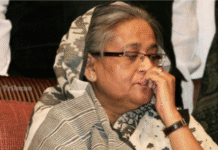A star called Arundhati
 Indian novelist, writer and Booker Prize winner Arundhati Roy recently visited Bangladesh to attend the Chhobi Mela. On 4 March, this author of ‘The God of Small Things’ spoke to Prothom Alo’s Tawhida Shiropa about her life, her family and more.
Indian novelist, writer and Booker Prize winner Arundhati Roy recently visited Bangladesh to attend the Chhobi Mela. On 4 March, this author of ‘The God of Small Things’ spoke to Prothom Alo’s Tawhida Shiropa about her life, her family and more.
There was an excitement building up inside. What do you say when you meet such a renowned writer? What do you ask her in an interview? And when she is one of your favourite and most admired authors, you can only imagine the state of one’s mind.
Arundhati greeted us with a warm smile and an outstretched hand at the guest house where she was staying. There she was with her familiar salt-and-pepper curls, adorned with little rose clips. She laughed somewhat abashedly, “Yes, these clips are my favourite.” Her eyes were lined with kohl, a tiny stone sparkled on the right side of her nose, earrings dangled elegantly and she wore silver bangles on her wrists. She looked her smart and graceful self in a pale green kameez and matching checked scarf.
Arundhati had featured on the cover of the magazine Elle. I couldn’t resist asking: “You are generally regarded as a serious person. How come you appeared on the Elle cover? It’s a lifestyle magazine after all!”
Arundhati broke out in laughter. “Who said I’m a serious person? Many people were shocked to see me on the Elle cover. That’s why I told them to add the line, ‘I am on the A list of anti nationals’.
Arundhati doesn’t see why one can’t be serious and stylish at the same time.
She is always upfront and blunt. Her work, her activities and her writings are often criticised by certain quarters. How does she deal with all of this? She says, “Not everyone has to like me. Some people will like certain things about me, others won’t. I am not controversial. I write about controversial things. I do not create controversy.”
Arundhati lives by herself in Delhi. She is always surrounded by the characters of her writings. But then there are two others who live with her at her home – her dogs, Begum Filthy Jaan and Maati Ki Laal. She’s quite eager to talk about them. “You know about them!” she exclaims, pleased. She describes how she found them. “I found them when they were just puppies near my house when I was out walking. They are quite grown now.”
“Do you walk every day? I read that you exercise a lot.”
“Yes! Actually frankly speaking, I had a lot of energy when I was young. I didn’t know what to do and would pester my mother. My mother would tell me to run a few rounds before going to sleep at night to wear off my excessive energy. And when I was studying architecture, I trained athletics to earn money. Now I go to the gym, do yoga and other exercises.”
“With such health consciousness, what do you enjoy eating?”
“Achar (pickle)! I also like Malayalam food—pilau made with red rice, and chicken. That’s my favourite!”
Arundhati Roy had dedicated her book ‘The God of Small Things’ to her mother. When Arundhati was just two years old, her father and mother were divorced. Her mother then moved to Kerala with her and her younger brother. Her mother struggled to bring them up.
Arundhati doesn’t like to call herself courageous. But it was from back then that she drew in inspiration and began to look at life differently. “My mother is an ordinary person. But if you analyse her thoughts and actions, you will see she is extraordinary. Incomparable.”
Her mother is still active. And one of Arundhati’s best friends is her brother. He lives in Kerala too.
Arundhati studied to be an architect. While a student of architecture, she would listen a lot to the Beatles. The Beatles have been her favourite since then, John Lennon in particular. She listens to Lennon every single day. She smiles sweetly, “I love John Lennon. You can say I am in love with him. I love whatever he does, the way he looks, everything.”
There is a childlike simplicity in this writer’s personality. What is happiness to her? She turns the pages of her book, ‘The Ministry of Happiness’, saying, “Happiness is a state of mind. It is not always the same. That does not mean one will remain sad all the time.”
We came back to the reason of her Dhaka visit, Chhobi Mela and her friend photographer Shahidul Alam. “Shahidul has asked me several times before to come over for Chhobi Mela, but I couldn’t. This is the first time I’m visiting Dhaka. I am unwilling to restrict this Chhobi Mal initiative by Shahidul as a mere festival. He is grooming up a generation. He must certainly be praised for this initiative. I do not attend events which have sponsors. I agreed to come when Shahidul said they didn’t have any corporate sponsors.”
We went on chatting. Arundhati’s sparkling eyes told us she had enjoyed herself. When her friend Suhashini turned up, Arundhati pointed to me and Prothom Alo’s associate editor Anisul Huq and said, “These two know me more than I know myself. They know everything!”
She has a special modesty and sincerity about her. She has the ability to draw one close. No wonder she stands out from other writers. She is a star called Arundhati.









